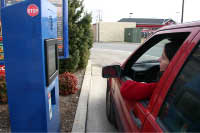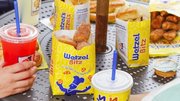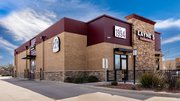Article
Franchisees mull over latest drive-thru technology
Dunkin' Donuts new concept stores opened since November 2005 in Euclid, Ohio, and Pawtucket, R.I., show a lot of thought was invested into maximizing the drive-thru experience.
March 12, 2006 by Julie Sturgeon — independent journalist, CEOEditor, Inc.
Dunkin' Donuts new concept stores opened since November 2005 in Euclid, Ohio, and Pawtucket, R.I., show a lot of thought was invested into maximizing the drive-thru experience. A preview board of suggested menu items greets customers, followed by an order screen employing a confirmation step to eliminate errors. Finally, as the customer places the order, the employee suggests a warm muffin to go with the coffee, or vice versa.
Yet the doughnut QSR could be behind the times in mere months, thanks to a pilot project in the works with Delphi Display Systems in Costa Mesa, Calif. To up the ante on its sunlight-readable display technology, it has written an algorithm that analyzes the order, displays text and JPEG photos suggesting additional food items and order upgrades on the confirmation screen.
According to Dave Boerlin, vice president of business development at Delphi, one test operator has seen drive-thru sales thru increase by $543 in a week.
 |
With today's drive-thru technology, the graphics do the upselling, not the employee. (Photo by Fred Minnick) |
"The application can analyze the data to see what is working. So you might find that suggesting a large Coke when they order small doesn't work, but small fries to large does," Boerlin said. He has the benefits down cold: relying on a human to suggest an apple pie with every order isn't as foolproof as programming a machine to make the mention. Simply put, technology tracking eliminates guessing and doesn't require re-training staff.
"I believe suggestive selling boils down to getting the words out, and that's the most difficult part," said Jimmy Fitzgerald, director of the new concept division for Canton, Mass.-based Dunkin' Donuts. "That's technology's advantage – it won't miss."
Roger Rowe, who owns two Guthrie's Chicken units in Destin, Fla., and Troy, Ala., expects technology he invests in to eliminate mistakes. After all, his average drive-thru ticket is higher than a counter sale, often because drivers are ordering for others back at the office or home. "Sometimes they come with a list, sometimes they don't, and if you make a suggestion for one item, you might get that item upsold for four people instead of just them," he said. "Upselling in the drive-thru is important because you can double your profit on an order."
Need for speed
 This story and all the great free content on QSRWeb is supported by:  |
Speed counts at David Maisel's five Bojangle's franchise units near Charlotte, N.C. His daily goal: a response time of five seconds or less, window time under a minute, and a total line time of two minutes, 20 seconds.
His average drive-thru ticket can be as much as 20 percent higher than counter sales, and more than 60 percent of his daily customer traffic goes through the drive-thru. Shaving even fractions of a second from every transaction is a priority, therefore, and he argues suggestive selling can actually slow the pace of service. But he wouldn't automatically dismiss a silent partner in the upsell game.
"Technology could do it well. More than likely you'd be giving people what they wanted anyway: an option to round their order to a size they want," he said.
Trends / StatisticsDrive-thruDrive-thru Audio / TimersDrive-thru Menu / OCBCoffee/Bakery/DonutFood & Beverage
 ChatGPT
ChatGPT Grok
Grok Perplexity
Perplexity Claude
Claude









